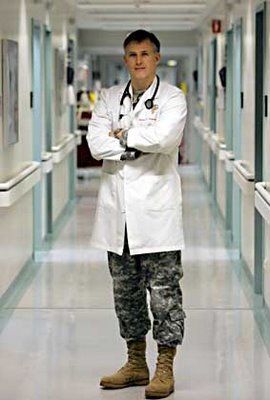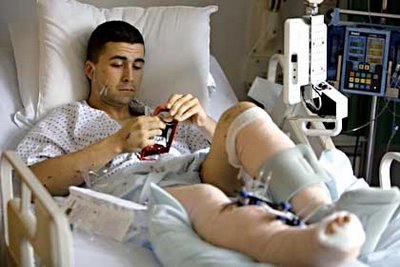You won't see any photos taken inside the hospital from me, but you may be interested in a couple from the article.
 Hallway on one of the wards. You'll also often see US Army and Marine Corps flags as well as flags from Coalition countries.
Hallway on one of the wards. You'll also often see US Army and Marine Corps flags as well as flags from Coalition countries.

Arrival of critical patients at Landstuhl, something I've witnessed many times:
The chaplain at the head of the welcoming committee personally greets the new arrival, just as every new arrival at Landstuhl is greeted personally, whether he is awake, asleep or in a coma. The priest stands next to the stretcher and leans in toward the patient, almost as if he were bowing, and, addressing him by his first name: "Michael", he says, "you are safe now. You're in Germany."
As the priest's purple-gloved hand forms the sign of the cross in the air above the wounded soldier, the hands of many others are already whisking the stretcher away toward the hospital, where it is loaded into an elevator and taken up to the ICU.
But not all arrivals are as dramatic:
The hospital has treated 38,000 patients since 2003, most with run-of-the-mill, non-emergency ailments or needs: broken legs, appendicitis, tonsillitis and births.
An inpatient's story of the attack in which he was wounded...
Gillilan and his men hid behind a wall, but in doing so they were falling deeper into the attackers' trap -- the wall was rigged with explosives. Once the Americans and Iraqi troops were safely behind the wall, the detonator was activated, perhaps using a mobile phone or a rebuilt TV remote control. The wall blew up, triggering several secondary explosions; flying shrapnel and rocks from the explosion seriously injured seven Americans and one Iraqi in Gillilan's group.
of those who saved his life...
Instead of dying on a street in Ramadi, he was saved by a medic -- a "91 Whiskey" -- who treated the wound on site as best he could under enemy fire, and managed to stop the bleeding. He was saved by the staff of a forward aid station consisting of two doctors, several nurses, operating tables and beds. He was saved by the helicopter pilots who flew him to Balad, a US base north of Baghdad. And he was saved by the doctors on board the C-17 who monitored his condition while he was being flown to Ramstein.
...and the caregivers in Landstuhl:
"It's a great honor to me," says Flaherty, "to care for our people from the front lines. They're good people who are doing good things. When somebody like that is lying in front of you, it's a special feeling for a surgeon. It's like family, and it has a quality of its own."
It's impossible to visit Landstuhl without hearing stories about heroes. "It's an incredible privilege to me to be able to welcome these soldiers," says Stephen Stavoy, the priest who met the bus of patients in the morning.
"Getting blown up is part of the job," said one of the Soldiers wounded in the attack described above.
Just like the helo pilot we visited last week shortly after he woke up in the ICU to learn he'd lost a leg. "I knew it was a dangerous job," he told us with a grimace and a shrug.
"Hard for outsiders to understand," says one of the soldiers in the article.
Yes, I suppose it is. But I wish it wasn't. I wish more people could understand.

No comments:
Post a Comment
Note: Only a member of this blog may post a comment.